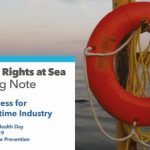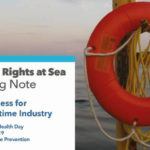
Pentland Ferries’ New Ship Arrives To Deliver Most Environmentally-Friendly Ferry Service
October 11, 2019
APM Terminals Barcelona Sets New Productivity Records
October 11, 2019
The 10th October is World Mental Health Day with this year’s focus being on suicide prevention. #WorldSuicidePreventionDay. Human Rights at Sea in partnership with author and mental health coach, Gillian Higgins, publishes a briefing note: ‘Mindfulness for the Maritime Industry’.
A report earlier this year identified that seafarers are amongst occupational groups with the highest risk of stress, a factor known to impact on mental health including the tragedy of seafarer suicide which has been highlighted as the ‘top cause of seafarer deaths’.
This has further driven the development of a number of maritime industry programmes, educational courses and advocacy drives aimed at addressing and raising the profile of seafarer well-being.
Faster turnaround schedules in ports, increased technology use causing higher levels of isolation onboard vessels and decreased crew numbers on ships are putting serious pressure on seafarers who may spend months or even years away from home.
So what can be done to support the maritime industry in caring for its mental health on this World Mental Health Day 2019 with a focus on suicide prevention?
In this Briefing Note, Gillian Higgins, an international barrister, mediator, mindfulness teacher and member of the legal team which advised on the 100 Series Rules for the Use of Force at Sea explains how mindfulness can help. She shares what inspired her to start practising, some of the benefits that may be reaped and how to get started.
WHAT IS MINDFULNESS? by Gillian Higgins
By now, most of us have heard about mindfulness, but what is it and how can you get started? It’s all about paying attention to moments of everyday life with curiosity and openness, on purpose. It involves dropping into our present moment experience and being aware of what we’re doing, while we’re doing it, with a non-judgemental attitude. It sounds easy, but increasingly it’s hard to find time to pause and take stock. Mindfulness invites us to experience the ‘here and now’, rather than hankering after how we would like life to be.
Research shows that our minds wander 46.9 per cent of the time, and that a wandering mind is for the most part, an unhappy one. We may find ourselves staggering around our mental ‘To Do’ list trying to remember to call home, file a report, deal with a difficult colleague and somehow get more sleep. The fact that our brains are burdened by a negativity bias doesn’t help as it means that we tend to remember the bad, the difficult and the ugly. Mindfulness encourages us to witness the essence of the moment, just as it is, so we don’t miss out on what’s going on, right now.
Although mindfulness is simple, the hard bit is remembering to do it. It can be practised anywhere – on land or sea, at any time of the day or night. One way is to learn mindfulness meditation, by using a point of focus, such as the passage of your breath. When your mind gets distracted and wanders off into thinking, worrying, or planning, simply notice where it has wandered to and gently guide it back to following the physical sensation of the in-breath and the out-breath. Do this every time the mind wanders – with kindness to yourself. With practice, you recognise that thoughts are not facts and will come and go of their own accord, if you allow them to do so.”
Press Release
Source: Maritime Shipping News



